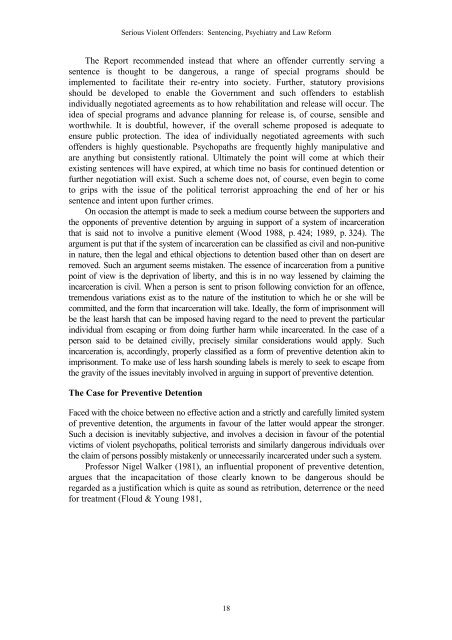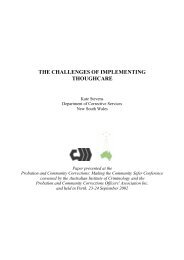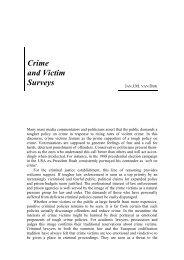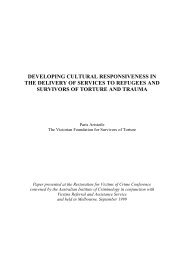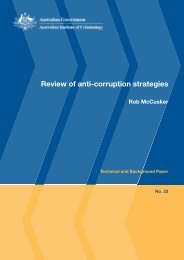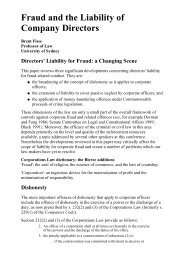Coping with the highly dangerous : issues of principle raised by ...
Coping with the highly dangerous : issues of principle raised by ...
Coping with the highly dangerous : issues of principle raised by ...
Create successful ePaper yourself
Turn your PDF publications into a flip-book with our unique Google optimized e-Paper software.
Serious Violent Offenders: Sentencing, Psychiatry and Law Reform<br />
The Report recommended instead that where an <strong>of</strong>fender currently serving a<br />
sentence is thought to be <strong>dangerous</strong>, a range <strong>of</strong> special programs should be<br />
implemented to facilitate <strong>the</strong>ir re-entry into society. Fur<strong>the</strong>r, statutory provisions<br />
should be developed to enable <strong>the</strong> Government and such <strong>of</strong>fenders to establish<br />
individually negotiated agreements as to how rehabilitation and release will occur. The<br />
idea <strong>of</strong> special programs and advance planning for release is, <strong>of</strong> course, sensible and<br />
worthwhile. It is doubtful, however, if <strong>the</strong> overall scheme proposed is adequate to<br />
ensure public protection. The idea <strong>of</strong> individually negotiated agreements <strong>with</strong> such<br />
<strong>of</strong>fenders is <strong>highly</strong> questionable. Psychopaths are frequently <strong>highly</strong> manipulative and<br />
are anything but consistently rational. Ultimately <strong>the</strong> point will come at which <strong>the</strong>ir<br />
existing sentences will have expired, at which time no basis for continued detention or<br />
fur<strong>the</strong>r negotiation will exist. Such a scheme does not, <strong>of</strong> course, even begin to come<br />
to grips <strong>with</strong> <strong>the</strong> issue <strong>of</strong> <strong>the</strong> political terrorist approaching <strong>the</strong> end <strong>of</strong> her or his<br />
sentence and intent upon fur<strong>the</strong>r crimes.<br />
On occasion <strong>the</strong> attempt is made to seek a medium course between <strong>the</strong> supporters and<br />
<strong>the</strong> opponents <strong>of</strong> preventive detention <strong>by</strong> arguing in support <strong>of</strong> a system <strong>of</strong> incarceration<br />
that is said not to involve a punitive element (Wood 1988, p. 424; 1989, p. 324). The<br />
argument is put that if <strong>the</strong> system <strong>of</strong> incarceration can be classified as civil and non-punitive<br />
in nature, <strong>the</strong>n <strong>the</strong> legal and ethical objections to detention based o<strong>the</strong>r than on desert are<br />
removed. Such an argument seems mistaken. The essence <strong>of</strong> incarceration from a punitive<br />
point <strong>of</strong> view is <strong>the</strong> deprivation <strong>of</strong> liberty, and this is in no way lessened <strong>by</strong> claiming <strong>the</strong><br />
incarceration is civil. When a person is sent to prison following conviction for an <strong>of</strong>fence,<br />
tremendous variations exist as to <strong>the</strong> nature <strong>of</strong> <strong>the</strong> institution to which he or she will be<br />
committed, and <strong>the</strong> form that incarceration will take. Ideally, <strong>the</strong> form <strong>of</strong> imprisonment will<br />
be <strong>the</strong> least harsh that can be imposed having regard to <strong>the</strong> need to prevent <strong>the</strong> particular<br />
individual from escaping or from doing fur<strong>the</strong>r harm while incarcerated. In <strong>the</strong> case <strong>of</strong> a<br />
person said to be detained civilly, precisely similar considerations would apply. Such<br />
incarceration is, accordingly, properly classified as a form <strong>of</strong> preventive detention akin to<br />
imprisonment. To make use <strong>of</strong> less harsh sounding labels is merely to seek to escape from<br />
<strong>the</strong> gravity <strong>of</strong> <strong>the</strong> <strong>issues</strong> inevitably involved in arguing in support <strong>of</strong> preventive detention.<br />
The Case for Preventive Detention<br />
Faced <strong>with</strong> <strong>the</strong> choice between no effective action and a strictly and carefully limited system<br />
<strong>of</strong> preventive detention, <strong>the</strong> arguments in favour <strong>of</strong> <strong>the</strong> latter would appear <strong>the</strong> stronger.<br />
Such a decision is inevitably subjective, and involves a decision in favour <strong>of</strong> <strong>the</strong> potential<br />
victims <strong>of</strong> violent psychopaths, political terrorists and similarly <strong>dangerous</strong> individuals over<br />
<strong>the</strong> claim <strong>of</strong> persons possibly mistakenly or unnecessarily incarcerated under such a system.<br />
Pr<strong>of</strong>essor Nigel Walker (1981), an influential proponent <strong>of</strong> preventive detention,<br />
argues that <strong>the</strong> incapacitation <strong>of</strong> those clearly known to be <strong>dangerous</strong> should be<br />
regarded as a justification which is quite as sound as retribution, deterrence or <strong>the</strong> need<br />
for treatment (Floud & Young 1981,<br />
18


